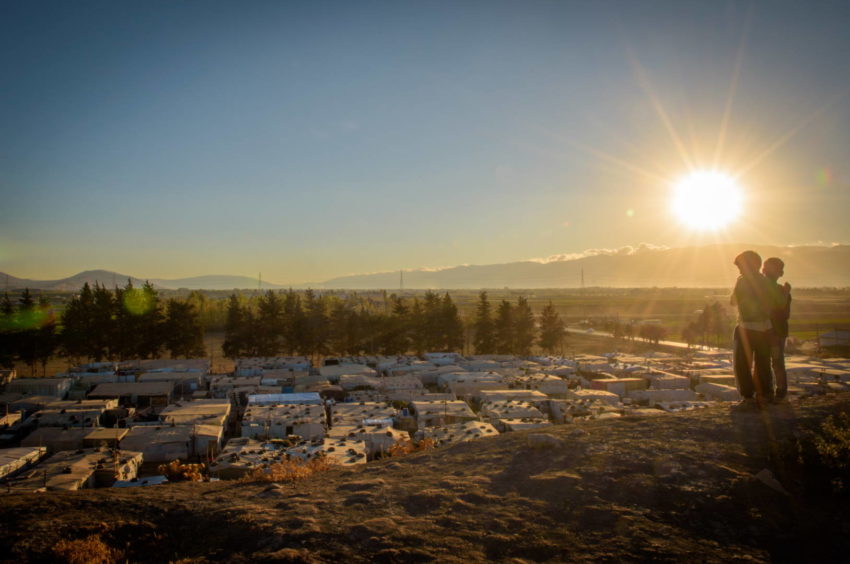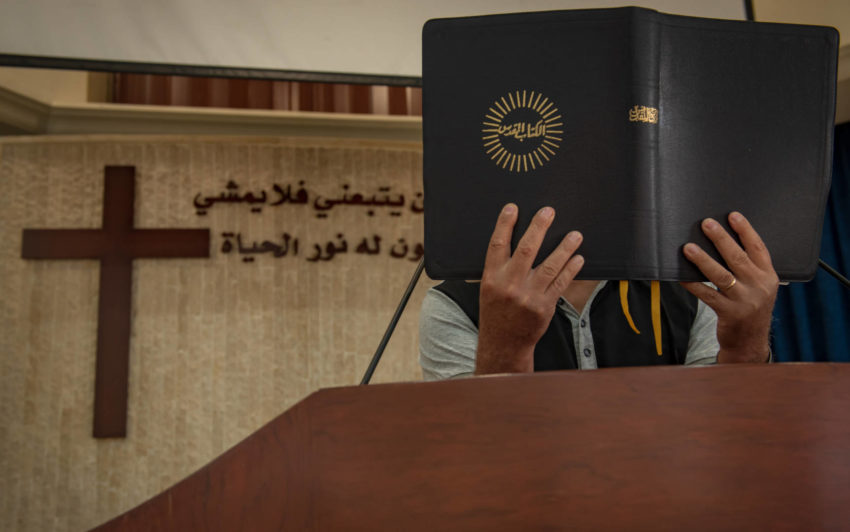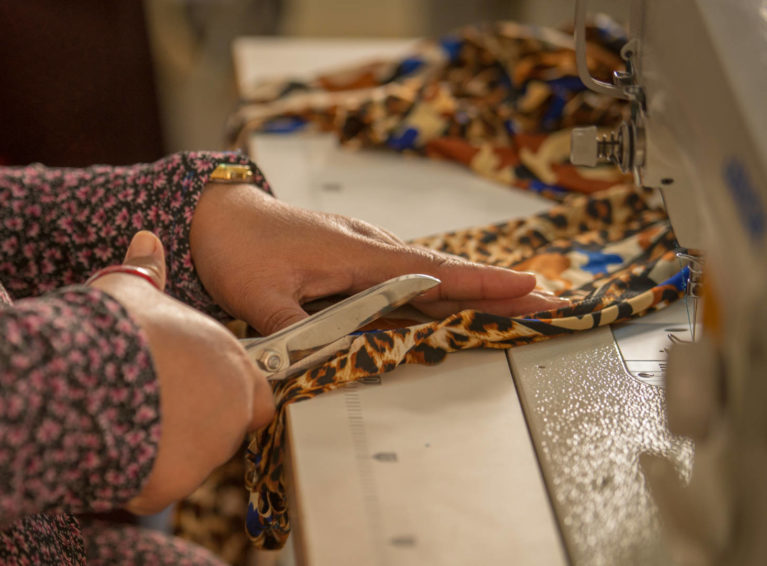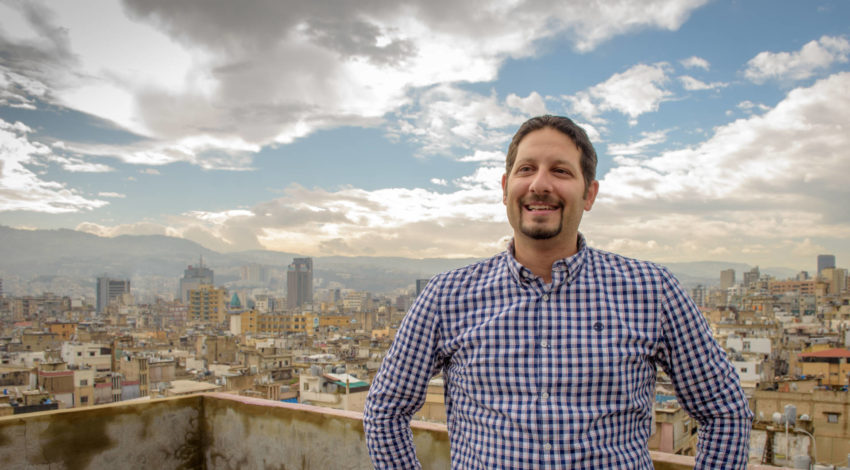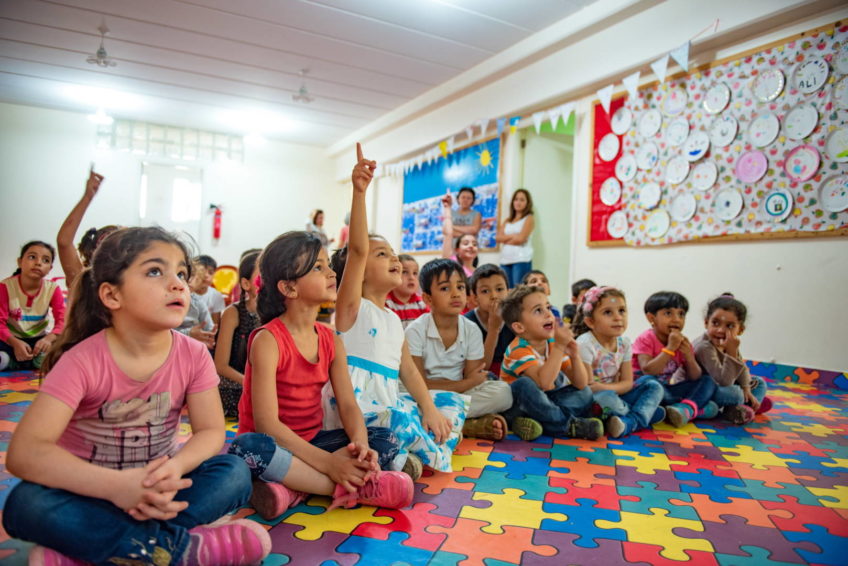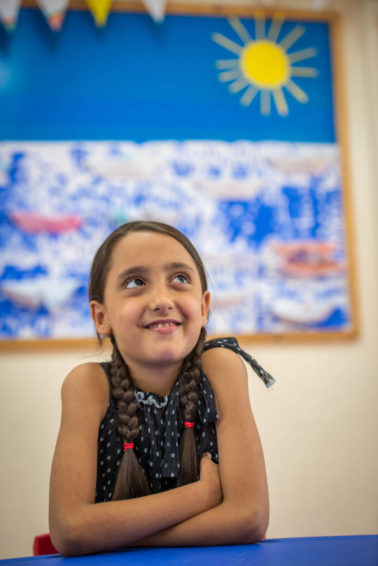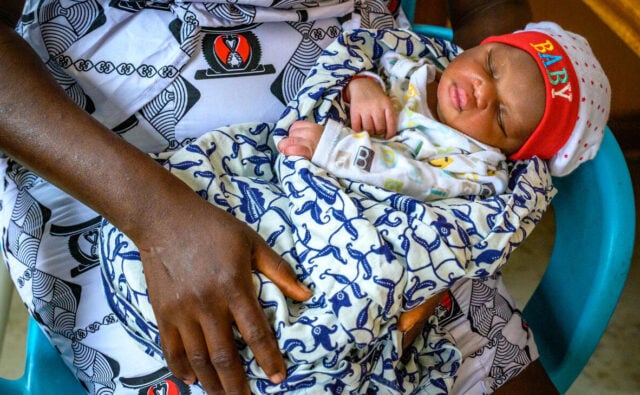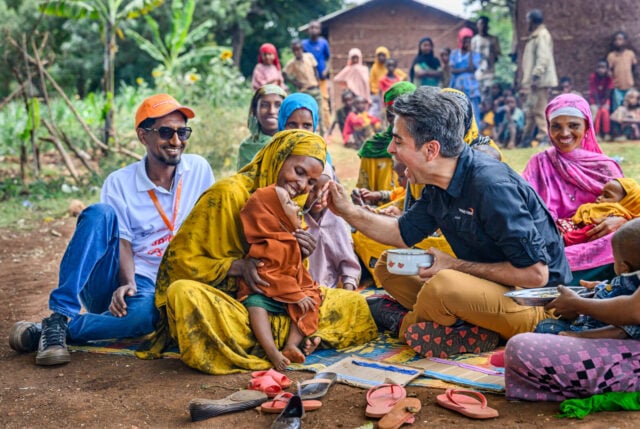Churches and ministries in the Middle East are embracing Jesus’ call to welcome the stranger, as more than 5.6 million Syrian refugees seek safety outside their war-torn home country. In Lebanon, despite a history of resentment and conflict between the neighboring nations, many Lebanese churches are providing critical social care and a powerful witness to the inclusive and transforming love of Jesus Christ.
When Fatima*, 41, and her children arrived in Lebanon’s Bekaa Valley in 2013, she felt defeated by the sight of small, shabby tents and detached latrines lined up alongside agricultural fields. “Who would live here?” she wondered aloud. Her taxi driver answered dispassionately, “You are going to live here.”
Back home in Syria, Fatima had run a successful tailoring business, which she’d started in her mid-20s after her husband’s death left her to provide for three young children. As a child, she dropped out of school to care for her siblings, but as an adult, she studied alongside her son for a ninth-grade entrance exam — and she passed. However, her most brutal trial has been surviving the horrors of war in Syria.
Two years into the conflict, militants attacked Fatima’s village of Idlib, killing eight of her relatives. They shot and killed her 14-year-old daughter — as she watched in helpless terror — then set her house ablaze. Fatima fled with her two surviving children and only the clothes on their backs.
For the past five years, Fatima has lived in a tent with her now 15-year-old daughter, 19-year-old son, and her son’s wife. She sleeps on cushions covering the cement floor and tries to keep rain from leaking in under the tarpaulin walls. It is a drastic downgrade from life in Idlib, where her family owned three houses.
And yet she radiates cheerfulness. “Even though I live in a tent in poor conditions, I am happy,” she says.
“Anytime people come, they say, ‘Why are you happy?’ and I say, ‘It’s the church.’”
Churches easing the burden
The Bekaa Valley, just over the border from Syria, became a destination for fleeing families like Fatima’s soon after the Syrian civil war began in 2011. One pastor, Miled, rallied his congregation to reach out with food, diapers, and blankets. Today, with support from World Vision, his church provides ongoing care for families in nearby tent settlements and runs two learning centers for refugee children.
…As a church, you can’t build walls around you. You have to reach out to the community.—Pastor Miled
Fatima heard there was a church helping refugees, but she was reluctant to go visit. “I had heard all bad things about Christians,” she explains. Instead, Miled visited her with a food parcel and an invitation to come to church. Once there, the Christians she met were caring and compassionate. Their help came with no strings — only a welcome mat.
Miled and his congregation have come alongside Fatima in practical ways, such as providing food and helping her start a sewing class to share her expertise. But they’ve also extended hospitality, friendship, and acceptance. The church is now a vital part of her life.
“Here in Lebanon, Muslims come to us, and we don’t hesitate to help them,” says Miled. “As a church, you can’t build walls around you. You have to reach out to the community.”
He continues, “A lot of the people served by the church asked, ‘What do you get from caring for us?’ We said, ‘Our only goal is to ease your burden.’ We never told anyone, ‘You have to go to church.’”
As Fatima got to know church members, cultural barriers broke down. She and Miled became close friends. He now calls her “my sister.”
Love never fails
A few years ago, Fatima expressed a desire to start a sewing class to train other refugee women. With support from Miled’s church, along with World Vision and MERATH, the relief arm of the Lebanese Society for Educational and Social Development, she outfitted a one-room tent with sewing machines, tables, and chairs, and began teaching two groups of women: one in the morning and another in the afternoon.
Some students started with no skills at all, but collectively the women became so proficient that they secured a contract to sew school uniforms for local children.
Through this business, Fatima is able to support her family, including her grandson named after Miled. She has a purpose. And thanks to the church, she also has peace.
“The pastor reinforced the idea that we must pray for our enemies,” says Fatima, who now prays for her daughter’s killers.
“I learned the meaning of love and mercy,” she says. “He taught me to forgive others. Now I have peace.”
Fatima also has the support of a church full of Christians who love her. “Love never fails you,” Miled says. “If you love honestly, an enemy will turn into a friend.”
Welcoming the stranger
Fatima’s story is only one example of how Lebanese churches and ministries are following Christ on the front lines of the Syrian refugee crisis. Since 2016, World Vision has partnered with churches and Christian groups in Lebanon, Jordan, Syria, and Iraq through an initiative called Equipping Churches to Serve Refugees.
These partners witness to God’s love through the simple acts Jesus spoke of in Matthew 25: feeding, clothing, comforting, and caring. But following Jesus’ call to welcome the stranger hasn’t always come easy.
In the beginning, the refugees’ presence was emotionally overwhelming for Christians like Maher el Hajj, Youth for Christ’s national director in Lebanon. Many Lebanese regarded Syrians with distrust and resentment. Following the Lebanese Civil War from 1975 to 1990, Syrian military dominated the peacekeeping force that remained in the divided country until 2005. Most Lebanese objected to what they regarded as a Syrian occupation.
Maher clearly remembers the years when Syrian soldiers roamed Lebanon’s streets, even beating and jailing his friends.
“I wasn’t ready to deal with the hate, the anger, the bitterness I had from when I was growing up,” he says. “But the reality of the gospel is very black and white.”
He couldn’t deny Jesus’ words in Matthew 5:44 — “love your enemies and pray for those who persecute you.”
As he struggled and prayed, the Holy Spirit began to work in his heart.
In 2013, he persuaded the ministry’s leadership to intentionally engage refugee youth, launching a groundbreaking program to serve Lebanese and Syrian youth together.
With funding from World Vision, Maher opened a new youth center in Bourj Hammoud, a densely packed, ethnically mixed neighborhood in Beirut. The center is called Manara, meaning lighthouse in Arabic, and it is that — a bright spot amid narrow streets and shabby buildings, some still marked with bullet holes from the war. The center provides recreation, informal education, psychosocial support, performing arts, vocational training, and special holiday events, all in a welcoming and inclusive environment.
Bible studies are also available for those who express interest.
Maher says the programs were designed in response to a United Nations report on Syrian refugees that found high percentages of youth out of school, feeling unwelcome and unsafe, and considering suicide.
“We know as Christians, our hope is in Christ. If I have hope in Christ, I have a goal, a purpose,” he explains. “The main purpose is reconciling the youth to God and reconciling to each other.”
Life in Christ
“There is something happening,” says Rev. Hikmat Kashouh, pastor of Resurrection Church Beirut. “Christ is revealing himself in this crisis.” Churches can be a driving force in what God is doing, he says, if only they embrace the opportunity.
Ever since Syrian refugees began flowing into Lebanon in 2011, Resurrection Church has provided food vouchers, counseling programs for adults, and education classes for children. The church helps newcomers feel like they fit in this community, despite their different backgrounds. Now, 70% of the people in the congregation are refugees.
Christ is revealing himself in this crisis.—Rev. Hikmat Kashouh, pastor of Resurrection Church Beirut
One Sunday, Hikmat preached on Psalm 23, describing a loving Shepherd who helps us through our trials.
“If you hear a voice that says you are useless, it’s not the voice of Jesus,” Hikmat said. “You are most precious. The Shepherd gave his life for you. You are the guest of honor at a feast that never ends.”
After the service, Adnan*, a young Syrian father, says, “I met God in this church.” He fled Aleppo with his wife and two daughters about five years ago, and now they live in a small apartment in Bourj Hammoud. His wife started attending church services first, and he followed, intrigued by the changes in her. “This is the life in Christ,” he says with wonder.
As churches learn to love all people, children do too
Adnan’s children attend Resurrection Church’s learning support program, which is partly funded and equipped by World Vision. The classrooms abound with cheerful color — seasonal decorations, children’s art tacked to the walls, and a padded floor mat with a multicolored jigsaw pattern. Four teachers and several church volunteers work with 60 students, ranging in age from 5 to 12, as they study math and learn to read and write in Arabic, English, and French.
In Lebanon, churches help fill a worrisome gap in refugee children’s education.
More than half of school-age Syrian children in Lebanon aren’t attending classes.
Some of this is due to capacity; refugees make up roughly one-quarter of the population, and the strain on infrastructure is intense. Some is due to hostility: many kids drop out because of bullying, and others don’t meet language requirements since Syrian schools don’t teach in the same languages as Lebanese schools. Some children already weren’t in school when the war broke out, and in the chaos of displacement, they’ve fallen further behind academically.
Adnan’s daughter Yana*, 10, attends education classes five days a week at the church. She had to drop out of a local school because the extra fees were too much for Adnan, who doesn’t have consistent work.
“My day would be harder without school,” Yana says. “At home, there’s nothing to do,” She enjoys playing at the center, learning from the kind teachers, and studying multiple languages. The Bible stories, values-based teaching, and Hikmat’s model are teaching her one of the most important lessons of all. “I [have] learned to love all people and help them,” says Yana.
Unconditional love is a breakthrough theme that reaches people of all backgrounds and faith and redirects their lives.
*Names changed to protect identity.
What you can do
- Learn more about the Syrian refugee crisis. Because of the Syrian civil war, 5.6 million people have fled Syria as refugees, putting a strain on the region’s ability to cope, and another 6.2 million people are displaced within Syria.
- Join us in praying for Syria, whose people are enduring their eighth year of civil war. Syrians desperately hope for peace, and children shouldn’t have to grow up in a war zone.
- Give a gift to help bring hope to refugee children. Together, we can show God’s love to the most vulnerable in their hour of greatest need — and make a lasting difference.
